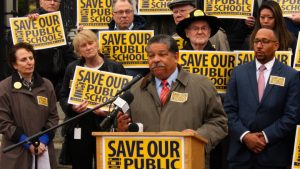Grassroots Organizing on the Issue of Charter Schools Nationally
Nationally, grassroots organizing that takes place around the issue of charter schools is most often led by concerned parents who want the best opportunities for their own and others’ children. The issue of charter schools is not split along political party lines, and as a result, grassroots groups advocating for or against charter schools often consist of a diverse range of people.
Anti-charter grassroots organizing mainly includes parents who are suspicious of charter school policies and outcomes. The central concern of anti-charter parents nationwide is that charter schools drain resources from already-struggling public schools. Their main tactic is to organize efforts to prevent charter schools from opening in their communities.
Pro-charter grassroots organizing includes groups of parents who feel that the traditional public schools to which their children have been assigned are failing to provide an adequate education and who, as a result, desire greater school choice. Unlike the anti-charter side, the pro-charter grassroots organizers are often joined by large for-profit organizations or philanthrocapitalists who believe in the power of using market-based solutions in education. Therefore, the pro-charter side often consists of tenuous coalitions formed between local parents and charter management organizations or other sources of big money. Together, these groups lobby in support of increasing the number and capacity of charter schools in their states.
Due to the nature of the arguments for and against charters, grassroots organizing around the issue of charter schools often intersects with communities’ concerns about racial inequality, poverty, and disability rights.
To learn more about specific anti-charter grassroots organizations around the country, visit the Grassroots around the U.S. page.
Grassroots Organizing on the Issue of Charter Schools in MA
Grassroots organizing regarding the issue of charter schools in Massachusetts peaked in the months leading up to the 2016 ballot question which would decide whether or not the cap on charter schools in MA was lifted (Question 2). Early on, polls seemed to show that the public supported lifting the cap; however, through an enormously successful campaign, grassroots organizers were able to shift public opinion on the issue (Blum, 2017). Ultimately, the initiative to lift the cap was defeated 62% to 38%.

Pro-charter advocates sign a banner.
The anti-charter grassroots organizers did not have an easy battle: although there was a contingent of pro-charter grassroots organizers, the pro-charter (“Yes on 2”) side of the debate was mostly backed by several major organizations and big money. The “Yes on 2” campaign spent nearly $25,000,000 in support of the initiative, and the top donor in favor of the ballot was Families for Excellent Schools (FES) which spent over $17,350,000. In contrast, the entire “No on 2” campaign spent a little over $17,000,000 (“Massachusetts Authorization,” n.d.).
FES did not originate in MA but rather came to MA in 2014 to advocate for charter school expansion after starting in New York. According to one pro-charter organizer in MA, FES “commandeered the [‘Yes on 2’] campaign and refused the expertise of people on the ground” (McNerney & Larkin, 2017). Thus, the “Yes on 2” side was clearly not a grassroots movement and was a formidable opponent to the anti-charter organizers.

A speaker at a “No on 2” rally
Nevertheless, the “No on 2” campaign build an extremely strong coalition of anti-charter groups, including many grassroots organizations. Parents, teachers, union leaders, students, and community members joined together under the Save Our Public Schools (SOPS) campaign which gave an overall structure and platform to the “No on 2” movement. The SOPS was organized by the Massachusetts Teachers’ Union and the American Federation of Teachers in Massachusetts, but the groundwork was done by not only union members but also hundreds of members of community organizations such as Boston Education Justice Alliance, Citizens for Public Schools, Quality Education for Every Student, and Teacher Activist Group Boston (Blum, 2017). These grassroots groups “ran a highly organized door-to-door and phone bank campaign” that characterized the “No on 2” movement (Blum, 2017, p. 4).
After the success of the anti-charter campaign, many claimed it as a victory for the power of grassroots organizing against big money and corporate interests (Blum, 2017). The executive director of Citizens for Public Schools called the win “a victory for public education and for the power of educating the public about charter schools” (Guisbond, n.d.). She continues, “The No on 2 campaign learned just how powerful a coalition of labor and civil rights groups, parents, students, school boards and elected officials could be. Students around the state, especially Boston students, found their voices and learned that they had considerable power to educate and influence adults” (Guisbond, n.d.).
To learn more about specific anti-charter grassroots organizations in Boston, visit the Grassroots in Boston page.
(For content and photo sources, please see the References page.)
